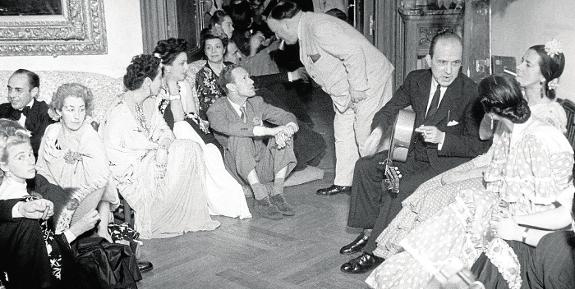
Secciones
Servicios
Destacamos
Secciones
Servicios
Destacamos
Tony Bryant
Friday, 27 November 2020, 17:48
The British Council is an organisation specialising in international cultural and educational opportunities that promotes a wider knowledge of the United Kingdom and the English language. The institute has branches in more then 100 countries, and this year marks the 80th anniversary of the first branch in Spain, which was founded by an Irish fiddle player in Madrid in 1940.
Walter Fitzwilliam Starkie (1894-1976) was an Irish scholar whose reputation was largely based on his travel books, Spanish Raggle Taggle and Don Gypsy, publications which described his colourful life on the road. He was an outstanding musician, writer and communicator, who travelled through Spain on foot during the early 1930s in pursuit of adventure, with only his violin for company. Starkie was also a leading authority on Romani culture and is said to have spoken the language fluently. His observations of Gypsy life, while more anecdotal than scholarly, provided insights into their language and customs.
His love affair with Spain and its people began when he honeymooned with his wife Italia - a Red Cross nurse he met in Italy during the First World War - in Spain in 1921. His connection with the country flourished when he was appointed to the Chair of Spanish at Trinity College in Dublin.
Arrival in Madrid
He arrived in Madrid at the age of 45 and began lecturing at the Residencia de Estudiantes, where he enjoyed the company of Spanish artists such as Miguel de Unamuno and Manuel de Falla. At the outset of the Spanish Civil War, Starkie announced his support for the Franco regime. This, together with his staunch Roman Catholicism, positioned him well with the new regime and paved the way for his nomination for the post of Director of the British Council in Madrid in 1940.
Launching of an institution
After securing suitable premises close to the Prado Museum, Starkie launched the institute at a special party for 70 English, Spanish and American guests. During his inaugural speech, he made a point of mentioning Shakespeare and Cervantes as symbols of the two countries.
His most outstanding contribution came in the field of education and during the inauguration he expressed his intentions to provide short, intensive English courses for young Spanish ex-servicemen who wished to sit the Diplomatic Service examinations. However, activities would not be limited to delivering classes. Cultural pursuits such as concerts, flamenco shows, films and exhibitions were also planned.
One of his early triumphs was a recital by Czech pianist Rudolf Firkusny, who was passing through Madrid en route to the US in October 1940. Finding a grand piano in Madrid at that time was no easy task, but Starkie was able to locate a new Steinway for the concert, which brought together a significant gathering of Madrid society.
The institute was also the setting for a series of successful public lectures, and guest speakers included British Ambassador Sir Samuel Hoare.
In December 1940, a primary school was established at the institute, and adult English classes had also been set up. Students were required to pay ten pesetas for registration. The institute also offered a non-student membership, which gave access to the library and a variety of activities including lectures, concerts and art exhibitions.
It was not long before Starkie told colleagues back home that the institute was being "besieged by people who are interested in our work", describing it as "like a London railway station in rush hour". With almost 500 students enrolled by early December 1941, it became necessary for Starkie to convert his private sitting room and spare bedroom into classrooms.
A lack of space remained an issue at the institute, where student and member registrations continued to grow. By July 1942, the number of students rose to 762, with an additional 100 primary school pupils to accommodate, so reorganisation of the premises was undertaken. Additional staff were also enlisted to keep pace with the institute's growing success and popularity.
Starkie was always alert to cultural opportunities and his enthusiasm and drive knew no boundaries: he was determined to make the British Council a centre of significant cultural activity.
Today, the British Council in Madrid continues to flourish. In the same manner as Starkie originally intended, the institute helps to establish connections with which students can realise their full potential and play an active role in cohesive and inclusive communities.
Developing links
Eighty years after he founded the British Council in Madrid, Walter Starkie is still remembered and respected for his tireless work in developing special links between Spain and the UK. He went on to open branches of the British Council in Barcelona, Bilbao, Seville and Valencia.
He retired in 1954, but continued to live in Madrid with his family until his death in 1976.
Starkie and his wife are buried in the British Cemetery in Madrid.
Publicidad
Publicidad
Publicidad
Publicidad
Esta funcionalidad es exclusiva para registrados.
Reporta un error en esta noticia


Debido a un error no hemos podido dar de alta tu suscripción.
Por favor, ponte en contacto con Atención al Cliente.

¡Bienvenido a SURINENGLISH!

Tu suscripción con Google se ha realizado correctamente, pero ya tenías otra suscripción activa en SURINENGLISH.
Déjanos tus datos y nos pondremos en contacto contigo para analizar tu caso

¡Tu suscripción con Google se ha realizado correctamente!
La compra se ha asociado al siguiente email
Comentar es una ventaja exclusiva para registrados
¿Ya eres registrado?
Inicia sesiónNecesitas ser suscriptor para poder votar.